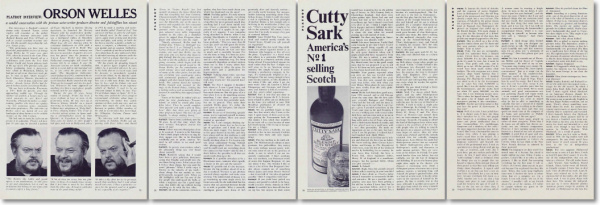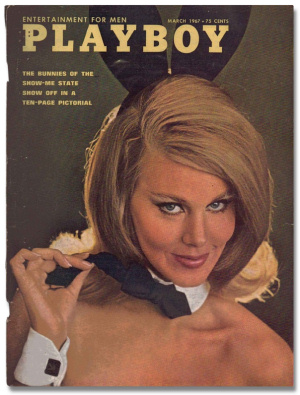Orson Welles (1915-1985) was born exactly 98 years ago. In an interview by Kenneth Tynan, published in Playboy on 1967, he comments about his alleged clairvoyant power and his idea that “accumulation of faith creates its own veracity”:

Kenneth Tynan, “Playboy Interview: Orson Welles” in Playboy (March 1967).
A prevalent rumor is that you have the power of clairvoyance. Is that true?
Well, if it exists, I sure as hell have it; if it doesn’t exist, I have the thing that’s mistaken for it. I’ve told people their futures in a terrifying way sometimes – and please understand that I hate fortunetelling. It’s meddlesome, dangerous and a mockery of free will – the most important doctrine man has invented.

But I was a fortuneteller once in Kansas City, when I was playing a week’s stand there in the theater. As a part-time magician, I’d met a lot of semi-magician racketeers and learned the tricks of the professional seers. I took an apartment in a cheap district and put up a sign – $2 READINGS – and every day I went there, put on a turban and told fortunes. At first I used what are called “cold readings”; that’s a technical term for things you say to people that are bound to impress them and put them off their guard so that they start telling you things about themselves. A typical cold reading is to say that you have a scar on your knee. Everybody has a scar on their knee, because everybody fell down as a child. Another one is to say that a big change took place in your attitude toward life between the ages of 12 and 14. But in the last two or three days, I stopped doing the tricks and just talked. A woman came in wearing a bright dress. As soon as she sat down, I said, «You’ve just lost your husband»; and she burst into tears. I believe that I saw and deduced things that my conscious mind did not record. But consciously, I just said the first thing that came into my head, and it was true.
So I was well on the way to contracting the fortune-teller’s occupational disease, which is to start believing in yourself; to become what they call a “shut-eye.” And that’s dangerous.
Do you believe in God?
I may not be a believer, but I’m certainly religious. In a strange way, I even accept the divinity of Christ. The accumulation of faith creates its own veracity. It does this in a sort of Jungian sense, because it’s been made true in a way that’s almost as real as life. If you ask me whether the rabbi who was crucified was God, the answer is no. But the great, irresistible thing about the Judaeo-Christian idea is that man – no matter what his ancestry, no matter how close he is to any murderous ape – really is unique. If we are capable of unselfishly loving one another, we are absolutely alone, as a species, on this planet. There isn’t another animal that remotely resembles us. The notion of Christ’s divinity is a way of saying that. That’s why the myth is true. In the highest tragic sense, it dramatizes the idea that man is divine.
But how do you reconcile that with–
For 30 years people have been asking me how I reconcile X with Y! The truthful answer is that I don’t. Everything about me is a contradiction, and so is everything about everybody I know. We are made out of oppositions; we live between two poles. There’s a Philistine and an aesthete in all of us, and a murderer and a saint. You don’t reconcile the poles. You just recognize them.
BY-NC-SA 4.0 • Attribution-NonCommercial-ShareAlike 4.0 International